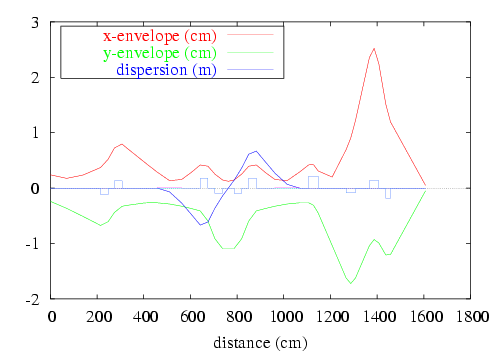Rick Baartman
ISAC-2 switchyard beams' characteristics
ISAC-2 switchyard beams' characteristics
February 22, 2006

 Figure 1: SEBT3A: 2 mm spot diameter for e=4 mm.
Figure 1: SEBT3A: 2 mm spot diameter for e=4 mm.
 Figure 2: SEBT3B: 2 mm spot diameter for e=4 mm. Low resolution tune.
Figure 2: SEBT3B: 2 mm spot diameter for e=4 mm. Low resolution tune.
 Figure 3: SEBT3B: 2 mm spot diameter for e=4 mm. High
resolution tune. Resolution = 800 for e=4 mm.
Figure 3: SEBT3B: 2 mm spot diameter for e=4 mm. High
resolution tune. Resolution = 800 for e=4 mm.
 Figure 4: SEBT3B: 1 mm spot diameter for e=4 mm. Low resolution tune.
Figure 4: SEBT3B: 1 mm spot diameter for e=4 mm. Low resolution tune.
 Figure 5: SEBT3A: 1 mm spot diameter for e=4 mm.
Smallest possible spot sizes on target versus emittance and drift length:
Figure 5: SEBT3A: 1 mm spot diameter for e=4 mm.
Smallest possible spot sizes on target versus emittance and drift length:
| emittance (mm) | drift (m) | div. (mrad) | spot dia. (mm) |
| 6 (Low E, pessimistic) | 1.0 | 20 | 1.2 |
| 2.0 | 14 | 1.7 |
| 3 (Typical) | 1.0 | 17 | 0.7 |
| 2.0 | 12 | 1.0 |
| 1.5 (High E, optimistic) | 1.0 | 13 | 0.45 |
| 2.0 | 10 | 0.62 |
SEBT3A and SEBT3B will run with doubly achromatic tunes. They can be
made identical, to have identical
beam characteristics. The only difference between the two legs is that
only SEBT3B can have a dispersed focus (at the midpoint between the
bends) of momentum resolution 800 (meaning a dp/p of 1:800 will
shift the beam over by one beam diameter)
while supplying beam on target. This means
on-line energy analysis/control with a slit.
 Figure 6: For completeness, here is SEBT2 for MAYA with e=6 mm.
Figure 6: For completeness, here is SEBT2 for MAYA with e=6 mm.
File translated from
TEX
by
TTH,
version 3.67.
On 23 Feb 2006, 13:29.







